|
Are We There (over the cliff edge) Yet?
 } }
Now that the European Union has been
cut adrift from our sceptred isle and we stand defiantly alone, many aspects of
life will change. Avocados may well become the new currency, spaghetti will
henceforth only be available in tins of sweet tomato sauce as it should be,
olive oil will once more be sold only from pharmacies on prescription, we will
have to wash and valet our own cars, and all young people aged 18 will be
forced to undergo two years of National (Health) Service working in our
hospitals to fill the staff vacancies, subject to the minimum wage and strict military
discipline.
More importantly, the changes to our
enjoyment of crime fiction may well be seismic. Unless a Norway style agreement
is reached, all Scandinavian crime fiction will attract a 125% tariff and
indeed may be rationed. (Iceland remains outside this stricture as no-one is
sure whether it is in the EU or not). To avoid a free-for-all under WTO rules,
the America First Edition Treaty, negotiated by President Trump personally,
will mean that a crime novel by a British writer can only be published in the
US if three American novels are published here (five if by James Patterson).
The works of Lee Child are, of course, protected by the Lend Lease policy
enacted by President Roosevelt in March 1941.
Swan Song
If the wonderful Bernie Gunther series
of thrillers had to end, no one in their right minds would have wanted it to be
due to the death of Philip Kerr a year ago at an unreasonably young age.
Knowing that his cancer was terminal, Philip finished his 14th
Gunther novel only weeks before his death and Metropolis, published
this month by Quercus, shows what a masterful storyteller he was.
Set in 1928 Berlin during the last
gasps of the Weimar Republic we find Bernie as a new member of the city’s famed
Homicide Squad on the trail of one, possibly two, serial killers preying on
prostitutes, of which there are plenty, and crippled war veterans, of which there
are even more. The back-drop is of decadent night clubs with all sexual
preferences catered for, organised crime, institutionalised anti-Semitism, the Expressionist
films of Fritz Lang and the emerging National Socialist party.
Our hero is the younger Bernie that we
have only glimpsed before; younger but not necessarily innocent. Already a hard
drinker and busy sharpening the cynical wisecracks that would stand him in good
stead in future, even darker, days. His views on musical theatre in particular
are priceless, especially when it is revealed he’s watching a rehearsal of The Threepenny Opera.
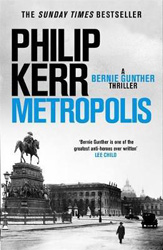
Metropolis is a first rate crime novel and a
superb historical crime novel, and should win prizes in both categories. If
nothing else (and there is much to admire here), the fantastic depth of Philip
Kerr’s research is fully on show and one can only stand back in wonder and
admiration.
The posthumous novel is published with
a heartfelt, if bittersweet, Introduction by Ian Rankin who recalls those heady
days, almost thirty years ago, of the informal group of emerging crime writers
known as ‘Fresh Blood’ and his admiration for Philip’s work even then. Ian also
rightly notes that Philip was great fun to have a drink with ‘mixing light
gossip with deep insights into politics.’
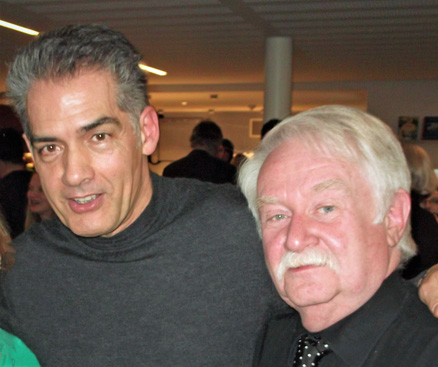
I can certainly vouch for that and have
dined out often on stories of him in our Fresh Blood days – some of them
unrepeatable on a family webpage – but the last time I lunched with Philip, a
month or so before the Brexit vote, the table talk was mostly about politics.
We both laughed, perhaps nervously, at the possible outcome of the referendum
and even, remembering our German history, admitted that people sometimes do
vote for the strangest things.
I Spy He
Spied
For legal reasons I missed Roland
Philipps’ excellent biography of Donald Maclean, A Spy Named Orphan, when
it was published in hardback last year. It is, however, now out in paperback
from Vintage and I recommend it most highly to any spy-fi nut or serious
student of 20th century British history.
Donald Maclean was one of the
‘Cambridge Five’ ring high-flyers who betrayed the establishment that nourished
them by spying for Russia in the 1930s and ‘40s. Oddly, as he was arguably the
most effective of them all, Maclean has been appropriated for spy fiction the
least. Others in the Cambridge Ring have guest-starred in novels, most notably
Kim Philby (Alan Williams, Frederick Forsyth and Robert Littell among others),
Guy Burgess (in John Lawton’s excellent Friends and Traitors last year) and
Anthony Blunt (Elizabeth Wilson).
Spy-fi fans need not despair for Roland
Philipps’ biography reads at times like a thriller as well as providing neat
asides and insights into British attitudes and the class system, which suffered
a non-fatal body blow during World War II. At times one has to ask how and why
there were not far more spies entrenched in the Foreign Office at the outbreak
of war (perhaps there were) and how on earth we managed to come out on the
winning side. A Spy Named Orphan provides numerous jaw-dropping examples of
incompetence and the blinkered approach to world politics which had once served
Britain well but was way out-of-time by September 1939.
For instance, I did not know that just
before Hitler’s attack on Poland, an Anglo-French delegation to Russia chose to
go by boat rather than air, as an aeroplane could not comfortably carry the
twenty-strong party and all their luggage. They also chose to travel on a slow
commercial freighter rather than in a much faster British warship as they felt
guilty about making twenty Royal Navy officers give up their cabins! The leader
of the military mission was the splendidly-named Admiral Sir Reginald Aylmer
Ranfurly Plunkett-Ernle-Erle-Drax, and I am sure a decent cruciverbalist could
easily find at least three Bond villains in that.
Dutifully researched by Roland Philipps
the material is cleverly marshalled and A Spy Named Orphan is a valuable
contribution to one of history’s most notorious spy stories. Will it be the
last word on the ‘Cambridge Ring’? Probably not, but on Donald Maclean’s part,
it is unlikely to be bettered.
Also for legal reasons I have not seen
Owen Matthews’ new biography of master spy Richard Sorge, An Impeccable Spy
published by Bloomsbury and receiving rave reviews.
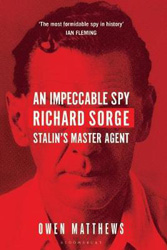
A legend in espionage circles – it is
said that a hundred books have been written about him – Richard Sorge
(1895-1944) is not that well-known a name in this country, even among die-hard
fans of spy fiction and being (supposedly) one of the inspirations for Ian
Fleming’s James Bond.
Born in southern Russia of a German
father and Russian mother, Sorge became a dedicated communist and, posing as a
pro-Nazi journalist, established a highly effective spy network in Tokyo in 1938
despite personal predilections for heavy drinking and being a dedicated
womaniser (you can see why he would have appealed to Fleming). He was able to
warn Stalin of Hitler’s plans to invade Russia, though was ignored, but his
assurance that Japan would not attack the Soviet Union was believed and Stalin
was able to withdraw troops from Siberia to defend Moscow and Stalingrad. He
was arrested by the Japanese and eventually executed in 1944, his career as a
successful spy reading like a thriller.
Indeed, I first heard of Richard Sorge
more than forty years ago in a thriller, or rather the fictionalised story of
his life, Death Plays the Last Card by Hans Helmut Kirst.
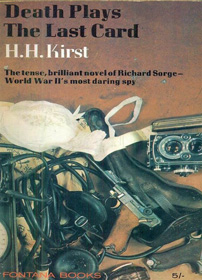
H.H. Kirst (1914-1989) was a hugely
successful German author, famous for Night of the Generals, though most
of his novels, usually set during WWII, are long out-of-print in English and
sadly forgotten. Death Plays the Last Card seems to be the most forgotten of
them all and I have over the years tried to replace my Fontana paperback
edition (foolishly loaned to someone in the days when I was naïve enough to be
so generous), without success. But I remember the book and the intriguing story
of Richard Sorge who seems, thanks to Owen Matthews, to have found the
biographer he deserves.
Sorcerer's Apprentice
Since the debonair and depressingly
young Jake Kerridge restored the art of crime fiction reviewing to that once
great newspaper the Daily Telegraph,
I have followed his career with interest. Recently he postulated a working definition of Domestic Noir to describe one of the
most popular trends in current crime fiction as where ‘a woman takes 400 pages
to realise her husband is a wrong ’un.’
He then went on the suggest that a
sub-sub-genre was necessary to cover the rapidly growing number of novels where
groups of ‘friends’, usually aided and abetted by social media (whatever that
is) discover that one or more of them is or are wrong ’uns. Jake suggested Chum Noir but I have a problem with that
involving memories of an unfortunate shark-fishing ‘accident’ off Martha’s
Vineyard some years ago (Acquitted) and I prefer my own newly-coined term: BFFN Noir, or Best Friends For Never
Noir.
Unreliable friends, like narrators, are
everywhere these days and it is only a matter of time before a self-appointed
authority on this sub-sub-genre compiles a reader’s history of the most
important examples. It could well be called Air
Kiss Bang Bang.
Hire Purchase
The publisher Robert Hale was famous
for publishing hardback editions of some notable American mystery writers
previously only published as paperback originals, the great John D. MacDonald
being a prime case in point. (And MacDonald was said to be very proud of his
British hardbacks which, these days, are eminently collectible.)
I did not realise that Robert Hale also
published the first UK hardback edition of Robert Bloch’s 1959 classic Psycho.
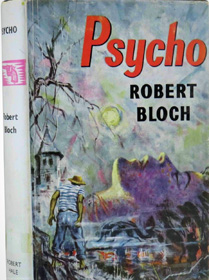
A copy recently advertised on eBay for
£420 also included (something else I did not realise was possible) the option
to buy on ‘easy terms’ through 24 monthly payments of £19.81. Now I am no
money-saving expert when it comes to things like APR and my shares in Wonga
have taken a dip of late, but a few moments with my trusty abacus indicates
that to take the hire purchase option for this £420 book would result in an
outlay after two years of £475.44.
Given that the value of the book may
well increase over two years, as I cannot conceive of it becoming less collectible, this may of course be
a good investment. Alternatively, two years after Brexit, first edition
hardbacks may be our only surviving asset.
London Calling
My visits to London have been numerous
of late, partly the social whirl but also some serious research in the British
Library and an encounter with modern technology which involved me broadcasting
to the world from the spectacular offices of HarperCollins on what I believe is
called a ‘podcast’.
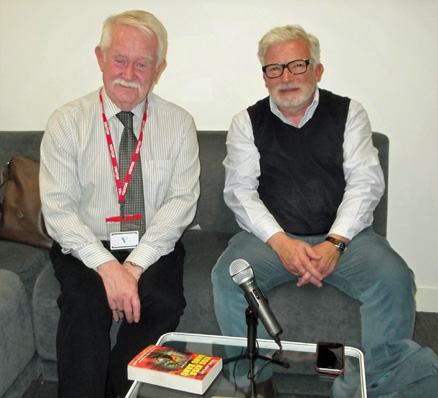
I was interviewed by spy-fiction
aficionado David Craggs for the excellent website Spybrary (www.spybrary.com/71) which I thoroughly
recommend to all fans of the genre
on the occasion of the paperback of
Kiss Kiss Bang Bang – revised and updated to include even more
spies!
CTAO NOIR
I may well have to invent yet another
sub-genre before the year is out and I am considering the catchy title of Counting Them All Out Noir based on the
growing number of mysteries which rely on a certain number of people going on a
holiday together, or to a remote island, or into the Australian outback, or
camping (you get the picture), but not all of them come back. We count them all
out, but we can’t count them all back; geddit?
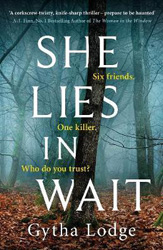
One new title which qualifies (as well
as for Jake Kerridge’s Chum Noir) is
the very impressive, really quite dark and chilling debut thriller She Lies
In Wait by Gytha Lodge, just
out from Penguin/Michael Joseph.
|
|
Books of the Month
I think it was George Clooney’s aunt Rosemary who actually sang Lord help the mister who comes between me and my sister in the film White Christmas (dubbing the voices of the on-screen talent) and surely it is the ultimate earworm when reading The Better Sister by Alafair Burke, out this month from Faber.
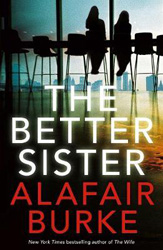
Two sisters share the same husband. The husband is murdered. Domesticnoir doesn’t come much more noirish.
Despite what the author might say, I don’t think Chris Brookmyre’s Fallen Angel, published by Little, Brown, really is ‘a holiday read that will pin you to the sunbed.’
Anyone remotely familiar with Brookmyre’s work will know that he doesn’t do relaxing, poolside reads, especially not when his subject matter includes a child gone missing whilst on holiday in Portugal, a family reunion sixteen years on, some toxic parenting and a spider’s web worthy of Shelob when it comes to conspiracy theories.
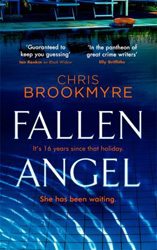
Personally, I wouldn’t take this on holiday, and certainly not to Portugal. I’d recommend reading it with the doors locked and the windows shuttered and with a large Scotch in one hand. I do like the title though.
I have no idea whether or not Steve Cavanagh is a member of the Crime Writers’ Association. He is such a genial and effusive chap that he probably isn’t, but if he was his membership might be called into question as in his new, stand-alone novel Twisted from Orion, he reveals the unpalatable truths that all crime writers are incredibly rich and also psychopaths.
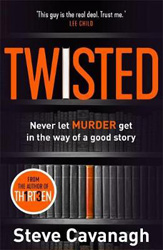
The crime writer at the centre of Twisted is the mysterious J.T. LeBeau {one hundred million copies sold} who is, of course, hugely successful, ruthlessly brilliant and mega-rich (the standard attributes of a crime-writer) but also totally anonymous and, it emerges, perhaps his wealth did not come entirely from royalties… And yes, credibility is stretched here, not in terms of being a murderous psychopath, but which published author, successful or not, doesn’t crave public adoration?
Twisted does have more twists than a basket full of cobras and at least two sharp-intake-of-breath moments. Cavanagh, who hails from Belfast, does his American setting well enough, zipping around the country with ease, though the geography is a little hazy at times – where exactly is Port Lonely? – and I was surprised to find that Americans talked about ‘paving flags’ (the concrete slabs which make up the sidewalk) as they do in Yorkshire and, I’m guessing, in Belfast. I also learned the expression ‘bun flask’ from which coffee is being constantly poured.
Which brings me to this month’s niggle: coffee in crime fiction. In olden days the reader just knew that when a character in a Peter Cheney novel put out a cigarette ‘and lit a fresh one’, the author was doing exactly that. The same applied to characters in Alistair MacLean thrillers when they poured themselves a large malt whisky.
Nowadays, its characters pouring, making, buying or just craving coffee which litter the pages of contemporary crime fiction and the reader is well aware that this is the author taking a break rather than anything to do with the plot of the novel. Test my theory for yourself on the next new title your read and count how many coffee breaks there are in the narrative.
Crime writers addicted to caffeine? It’s just as well that we are all so rich and successful that we will be able to afford a decent Blue Mountain roast after Brexit.
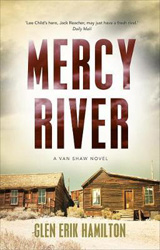
There have been numerous attempts to emulate the hero figure that is Jack Reacher – the former military man, usually American, now acting as knight errant in a corrupt civilian world. One such hero, launched here over a year ago, was Nick Petrie’ Peter Ash and a new one, at least to me, is Donovan ‘Van’ Shaw, as created by Glen Erik Hamilton in Mercy River, published by Faber.
The set up of Mercy River is a familiar scenario: a former US Ranger gets into trouble and is arrested in a small, one-horse rural town (this time in Oregon) and so calls his best veteran buddy (Van Shaw) who drives down from Seattle with a lawyer at the drop of a green beret. This could have been a standard Western plot where the hero rides into town and says ‘I’ve come for my boy’ but the twist here is that Mercy River, the small town in question, is heaving with US army Ranger veterans who have adopted it as the venue for a raucous annual reunion. It turns out to be quite a party.
Warming the Blood Pressure
Slightly later this year than usual (blame Brexit), the annual Crimefiles’ Warming the Blood party was an outstanding success, showcasing the crime fiction of the Hodder, Headline, John Murray and Quercus imprints, with dozens of authors, talented newcomers as well as some well-worn well-known faces. Rather than struggle myself with a tripod and magnesium flash-gun, I retained the services of Ali ‘Snapper’ Karim to record the event. I really do think every gentleman of a certain age should have a personal selfie-taker.
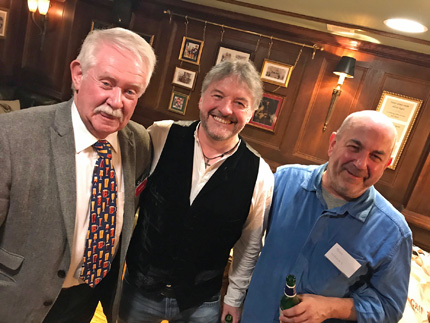
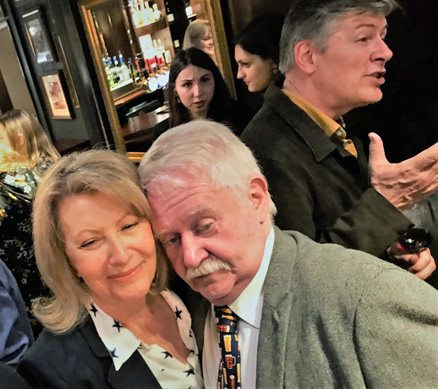


It was good to see that Irish imp John Connolly again even though I had only just received his latest 700-page bestseller A Book of Bones and had not yet had a chance to read it. Fortunately the author of Fade To Grey, John Lincoln, helped me wing it though I could not help noticing that he bore a striking resemblance to novelist and critic John Williams…
And I was in the process of asking probing questions to another Williams, Andrew this time, about his forthcoming spy thriller Witchfinder, when I was accosted by a glamorous and very charming lady whom I could have sworn used to be called Anne Zouroudi. If indeed it was Anne, it must be six years since I last encountered her, but thankfully she has forgiven me.
The perceptive Jake Kerridge was there, naturally, and both of us are looking forward to the launch party (and of course the book) for the BBC’s very own Peter Hanington’s upcoming thriller A Single Source. Sadly, my catch-up time with the talented Vaseem Khan, whose Bad Day at the Vulture Club comes out in August, was rather limited. Vaseem and I dined together at last year’s Gala Banquet at Crimefest, but he mysteriously had to leave ‘to catch a train’ before the highlight of the evening, the announcement of the H.R.F. Keating Award. Still, it was good to see him and to chat about his previous – and little known – career as a supplier of the finest island malt whiskies to the landed gentry.
Mississippi Mud
For years I have been misquoting the wonderful Mae West’s famous line from the film I’m No Angel as ‘Tallulah, peel me a grape’. It should, of course, be ‘Beulah, peel me a grape’ but I only realised my mistake whilst reading Cemetery Road by Greg Iles, out now from HarperCollins.

Iles’ new novel features a character called Tallulah, a black maid in a posh Mississippi mansion, one of the few people without a shady past in the town of Bienville which is run by the exclusive Poker Club of the most rich and powerful of the citizenry. The town is on its uppers and the prospect of billions of dollars of investment (and jobs) due to a planned Chinese paper mill is threatened by a pesky archaeologist turning up ancient artefacts on the proposed site. Naturally, the archaeologist is doomed.
Whilst there are shades of In the Heat of the Night in the set-up here, Cemetery Road works as a family saga with crime rather than a murder-mystery. There are some Americanisms which will initially baffle many a British reader (such as ‘Frontgate Catalogue’), but don’t take too long to work out. I was rather proud that I already knew the expression ‘McMansion’ thanks to the novel of that title by my old and distinguished chum Justin Scott.
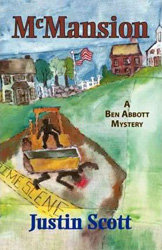
Greg Iles’ take on the secrets and lies hidden in the Mississippi mud weighs in at almost 600 pages, but the author sure keeps them turning.
Prolific Bush
For those who simply cannot get enough of the detective stories of Christopher Bush, fear not because the admirable Dean Street Press will be republishing another ten titles next month, which should keep them going until a further ten, and then another twelve appear making, if my arithmetic holds up, the full complement of 62 novels.

Christopher Christmas Bush (1885-1973) was born in Norfolk – Christmas was not an unusual name in Norfolk and Suffolk in the 19th century – wrote around 70 novels, the bulk of them featuring his detective Ludovic Travers.
Of the recent tranche of reissues, I was particularly intrigued by The Case of Haven Hotel, first published in 1948, as it uncannily predicted the great Elmore Leonard’s ‘Rules of Writing’ which advised never to use a prologue. Chapter One of Haven Hotel begins:
A prologue can be an irritating thing. It is like being forced to stand in the queue and listen to mediocre buskers when one might be in one’s comfortable seat and enjoying the show. I have tried to avoid it but I don’t see how I can, since halting a story for the sake of explanation or harking back to account for something else seems to me more irritating still.
Elmore Leonard put it more succinctly as simply ‘Avoid prologues’, but the principle is the same.
Post Scriptum
Lindsey Davis’ latest Flavia Alba novel of mis-deeds and murder in Imperial Rome, A Capitol Death (Hodder) is not just a welcome addition to any decent crime fiction library, but could find a place in any self-respecting archaeology section.
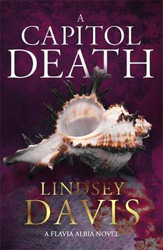
I say this because it attempts to answer one of the mysteries of Ancient Rome. We are all – well, anyone with a classical education (okay, so that limits it) –familiar with the legend of the Tarpeian Rock, named after Tarpeia, the daughter of Spurius Tareius, the commander of the Roman Capitol during the war with the Sabines following the rape of their women. (Surely you’ve heard of that.)
Tarpeia supposedly tried to betray Rome, and was executed as a traitor. Or she was killed by the Sabines, or she was a local deity with a cult of followers who is now long forgotten. Whatever; traitors to Rome were reputedly punished by being ‘hurled from the Tarpeian Rock’ – a phrase used many a time in MI6 (where classical educations predominate) during the Cold War – but no one was ever quite sure exactly where the Tarpeian Rock was supposed to have been. Well, apart from the Rome Tourist Board that is, which advertises tours and visits.
Traditionally situated below the Capitol, Lindsey has followed new theories and scholarship and positioned it in the Arx (the old Citadel), in 89AD. I will have to read A Capitol Death very carefully to check her hypothesis, but that’s always been an enjoyable chore in the past.
Post Ponement
The May edition of this august column will appear slightly later than usual, partly because I will be composing myself for the annual extravaganza which is CrimeFest in Bristol (www.crimefest.com) and I have to visit the south of France to negotiate a frictionless trade deal with the wine-merchants of Languedoc-Roussillon. Blame Brexit.
À bientôt,
Le Ripster.
|